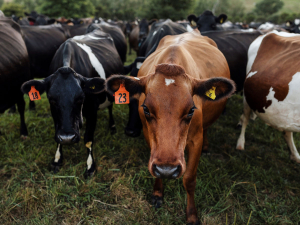We must keep our foot on the pedal
OPINION: Last week marked a major step forward in our work to eradicate Mycoplasma bovis.
 OSPRI has taken over the day-to-day control of the Mycoplasma bovis (M. bovis) eradication programme.
OSPRI has taken over the day-to-day control of the Mycoplasma bovis (M. bovis) eradication programme.
OSPRI – the government agency that manages animal disease and pest control in the farming industry – has taken over the day-to-day control of the Mycoplasma bovis (M. bovis) eradication programme.
M. bovis governance group independent chair Kelvan Smith says OSPRI will oversee operational and disease control functions under a contract for service.
“OSPRI’s role will include the testing of farms, managing the current active confirmed property, any newly detected farms, cleaning and disinfection, and farmer support.”
Smith adds that the programme partners – MPI, Beef + Lamb New Zealand and DairyNZ – will continue to provide governance and monitor progress.
“MPI will retain nonoperational aspects of the programme, including compensation and any necessary compliance action,” he explains. “We expect farmers to notice very little difference from current operations and the existing Government Industry Agreement between MPI, DairyNZ and Beef + Lamb New Zealand remains in place until a National Pest Management Plan (NPMP) is approved and established.”
Smith says the consultation on an NPMP recently closed with some good submissions from farmers.
“We have received submissions that are largely supportive of the proposal and the next step is to analyse and consider the feedback and update the draft proposal as appropriate.”
It is expected the final proposal will be submitted to the Government in early 2024. “We are planning for the NPMP to be in place by mid next year, subject to approval.”
Smith says the M. bovis eradication programme continues to perform well.
“The number of infected properties has fallen to very low levels and the major activity of the programme will be national surveillance of New Zealand’s cattle herd.”
He adds that the timing is now right to look at capitalising on the identified efficiencies to ensure all the partners – DairyNZ, Beef + Lamb New Zealand and the Government – are receiving value for their investment.
Smith believes that farmers should not be affected by the move and the M. bovis levies will not increase.
“OSPRI will provide extensive experience in disease management and surveillance, with an established regional management model for disease management,” he says.
“There will be streamlined engagement and operational efficiencies with existing OSPRI programmes, NAIT and TBfree.”
New Zealand and Chile have signed a new arrangement designed to boost agricultural cooperation and drive sector success.
New DairyNZ research will help farmers mitigate the impacts of heat stress on herds in high-risk regions of the country.
Budou are being picked now in Bridge Pā, the most intense and exciting time of the year for the Greencollar team – and the harvest of the finest eating grapes is weeks earlier than expected.
The Real Estate Institute of New Zealand (REINZ) has released its latest rural property report, providing a detailed view of New Zealand’s rural real estate market for the 12 months ending December 2025.
Rural retailer Farmlands has released it's latest round of half-year results, labeling it as evidence that its five-year strategy is delivering on financial performance and better value for members.
OPINION: "We are back to where we were a year ago," according to a leading banking analyst in the UK, referring to US president Donald Trump's latest imposition of a global 10% tariff on all exports into the US.

OPINION: A mate of yours truly reckons rural Manawatu families are the latest to suffer under what he calls the…
OPINION: If old Winston Peters thinks building trade relations with new nations, such as India, isn't a necessary investment in…